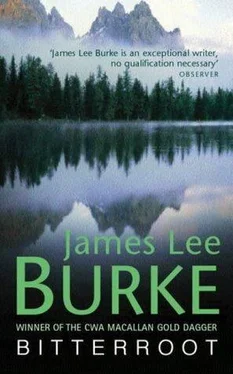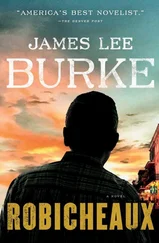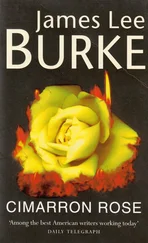"It was Lamar Ellison. I'd gone up to the Indian family's house to check on the children. He followed me," she said.
"Ellison? Why's he coming around you?" I said.
"I don't know. I saw him on his motorcycle out on the road. The Indians don't have a phone. I couldn't get back to the house. It was awful," she said.
"Did he do anything?"
"No, he just sat out there in the twilight, looking up and down the road. Then he left."
"I'm coming out," I said.
"No, I have to go to work. I'll call you this afternoon."
"Cleo-"
"I'm sorry. I have to go. I didn't sleep much last night."
"Does this have anything to do with your son?"
"How would I know? I just hope this man Ellison dies a horrible death. I hate him," she said.
I WENT outside and lifted my fly vest and canvas creel off a wood peg on the front porch and put on my hip waders and drove my truck along the dirt road to a spot on the river that was seldom fished. I walked a quarter of a mile through woods and down a soft, green slope where huge gray boulders seemed to grow out of the soil like mushrooms without stems. I waded into the river, which was ice-cold from the melt and lack of sunlight, and fished a deep pool that was fed by a small waterfall.
The days were growing warmer now, and each morning the snow line in the mountain crests was receding and the rivers and creeks were rising and turning from green to copper-colored.
I tied on a royal coachman and coated it with fly dressing and cast it out twenty-five feet into the riffle at the head of the pool. A rainbow rose from the gravel bed and hit the coachman as it floated toward me, high and stiff and flecked with red hackle on top of the riffle.
The rainbow must have been sixteen inches and should have been mine. But just as I saw the strike, like a flickering of quicksilver on top of the current, and jerked up my rod, I heard the loud roar of a motorcycle out on the dirt road. I cut my eyes in the direction of the road and the fly went whipping past my head into a tree limb and the rainbow's dorsal fin roiled the surface and disappeared.
I saw the rider of the motorcycle pull to the top of a knoll above me and look down at me through the trees. He gunned his engine, the straight exhaust pipe violating the green-gold, pine-scented stillness of the air, reverberating off the boulders on the hillsides and through the gullies that fed into the river.
Then he drove back toward my truck.
I pulled my royal coachman loose from the tree and walked back up the slope toward the road.
The motorcycle driver went past me, looking me full in the face, then turned around a hundred yards down the road. I removed my fly vest and laid it on the hood of my truck and took L.Q. Navarro's.45 revolver out of the cab and put it under the vest.
Lamar Ellison cut his gas feed and let his bike coast to a stop next to the truck. He slid his sunglasses up on top of his head, his eyes wandering over my person.
His body seemed larger in the shadows of the trees, his bronze skin darker. He swung one leg over the motorcycle seat, like a man getting down from a horse, and stood two feet from me. The wind puffed at his back and I could smell reefer in his clothes and hair and an odor like rotted teeth or decaying meat on his breath. I leaned my fly rod against the truck and rested my forearm on top of my fly vest.
"Say it quick," I said.
"I didn't know the guy was a SEAL. I was in the Corps. I'm sorry about his daughter," he said.
"You didn't sound that way over the phone."
He touched at his nose with his wrist and blew air out his nostrils. He glanced up and down the road, and put an unlit cigarette in his mouth, then pulled it back out and stared at it stupidly.
"Other people were listening. It was all flash, man. They got me made for a snitch," he said.
He was bare-chested except for his cracked, black leather vest. He inserted his hands in his armpits as though he were cold.
"What were you doing up around Cleo Lonnigan's place?" I asked.
"Looking for you. I got Sue Lynn to call and ask where you was at. Sue Lynn's an Indian broad who digs bikers. I mean, she'll pull a train if she has to."
When I didn't reply he stuck his hands into his pockets, then refolded his arms across his chest and gripped the outside of his triceps.
"I can't go back inside, man. I got the Mexican Mafia and the Black Guerrilla Army down on me. When you're inside, they can reach out anywhere you're at. The Aryan Brotherhood ain't always there. The BGA is. Main pop anywhere is seventy percent boon."
"It's time for you to go," I said.
His lips were dry in the shade, the skin of his face grained with dirt. He shifted his weight and dust powdered around his boots. His eyes were like those of a man trying to figure out how to get inside a bus after the doors have been closed on him.
"Two other guys nailed her first. I'll give them up," he said.
"Are you that afraid of Doc?"
"I want Witness Protection. I talked to an ATF guy. He made fun of me. He said Voss was in the Phoenix Program. He said Voss would find me and cut off my ears and put out my eyes and paint my face."
His eyes were dark green, with cinders for pupils, and now they were wet along the rims.
I lifted up L.Q. Navarro's revolver from under my fly vest and cocked back the hammer.
"You either get out of here now or I'll shoot your sack off. My hope is that you don't believe me," I said.
That afternoon I picked Cleo up at her house and we drove toward Flathead Lake to have supper, through ranchland and low hills, along an undulating, boulder-strewn river, into a golden sun. I told her about my encounter with Ellison and the fact that his interest had been in me, not her.
"Why do you believe anything a man like that says?" she asked.
"Because the ATF has obviously jammed him up. Because he's a coward and could hardly hide his fear. I don't think he was lying."
"Why does the ATF care about him?"
"He's mixed up with this militia bunch. Maybe he's dealing guns for them."
We drove through a long, green valley, past the Mission Mountains, whose timbered slopes rose into the clouds. Then I saw Flathead Lake for the first time, so vast it looked like an ocean, its blue water ringed by hills, its eastern shore terraced with cherry orchards. The sun had dropped below the mountains and the air was suddenly cool and touched with rain and the smell of wood smoke, and I looked at the shadow that never seemed to leave Cleo's eyes and squeezed her hand.
"Why'd you do that?" she said.
"You ever read Ernest Hemingway?" I asked.
"A little."
"In For Whom the Bell Tolls a Republican guerrilla is about to die on a hilltop in Spain and he tells himself, 'The world is a fine place and well worth the fighting for.' I always try to remember that line when I get down with the nature of things," I said.
We stopped at a restaurant on the eastern shore. It was too cool to eat by the water, but we took a table near the back window where we could see the afterglow of the sun on the hills on the far side of the lake and a steep-sided wooded island where there was a lighted log mansion set inside the trees and a white seaplane was taxiing in a rocky cove at the base of a cliff.
"I might have a chance to buy one of those islands out there," she said.
"You have that kind of money?" I said.
"Not really. But you only live once, right?"
It started to rain out on the lake, and the string of electric lights over the marina came on and Cleo gazed at the boats rocking in their slips, her thoughts known only to herself.
"This is one of the prettiest places I've ever been," I said.
But she didn't seem to hear me.
"I talked with an FBI agent about my son once," she said. "I told him my son was killed on National Forest lands. I thought I could get federal help solving his murder. He called back and said he checked, the body was actually on a state road when it was discovered. I hung up. I couldn't find words to speak. I've always regretted that."
Читать дальше












